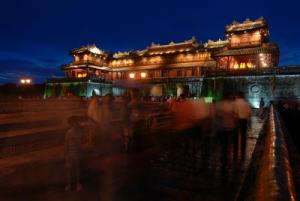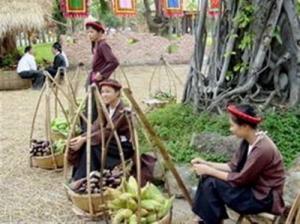Celebrating the Lan-Bao Hieu Festival with Lessons, Prayers and Meals

Vietnam may be a mix of different cultures and traditions, but Confucianism and Buddhism are among the strongest influence in the lives of its people. As filial reverence is the primary duty of all Confucianists, such could be strongly observed in the country. Many of its rituals and events center on the performance of filial duties, including daily prayers at the family altar. A particular festival, the month-long Vu Lan-Bao Hieu festival is perhaps the most prominent demonstration of this culture.
The festival peaks on the fifteenth day of the seventh lunar month, which falls this year on August 24. It is one of those times of the year where pagodas are more crowded than usual. Vien Giac Pagoda of Ho Chi Minh City’s Tan Binh District is among those that have to accommodate larger crowds during the fifteenth day of the seventh lunar month. The time provides opportunity for society as a whole, not just the Buddhists, to visit pagodas and pray for their parents, and the monks would read from the Ullambana Sutra and the Bao hieu phu mau an (Fulfilling filial duty for parents) Sutra to them every evening.
The Bao hieu phu mau an Sutra, contains the Buddha’s thoughts on a child’s obligations to his parents and the fate suffered in the afterlife by those who treat their parents badly while the Ullambana Sutra is a discourse by Gautama Buddha. As they are read, the story of Maudgalyayana is also told - - - an old tale deeply connected to the virtues of filial piety, talking of how Maudgalyayana saved the soul of his departed mother through prayers and food to appease her hunger.
With the intertwined beliefs and practices, a special feature of this month is the gathering of large number of people to dine on vegetarian food in the pagodas. For a long time now, most pagodas have been treating all visitors to a free vegetarian meal during such time of the year. For the people who come, dining on the meals prepared in the pagoda brings them good fortune and health.
And among the favorite stops of faithful followers, Vien Giac Pagoda offers food to visitors from 9.a.m. to 4.p.m. Other pagodas practice the same, however, the food they serve could vary depending on the number of visitors expected and logistical arrangements possible. At the Phung Son Pagoda in District 11, for instance, the devotees are seated 10 to a table and served by volunteers, fostering friendship and goodwill between friends, relatives and strangers. On the other hand, pagodas in the countryside offer a fresher, friendlier atmosphere and larger spaces, and the locals invariably not only serve delectable vegetarian meal, but their friendship and hospitality as well.
Because of the practice and the growing popularity of vegetarian food, pagodas who serve devotees yearly have started to earn reputation for their culinary expertise. The Phat Nhut Pagoda in Chau Thanh District is among the famous places known to serve very delicious vegetarian food. With the growing number of people coming during the annual festival, they expect to serve more than 300 people on the auspicious day. Diners have also developed their favorites. Sour soup (cooked with mint, tomato, tofu and other vegetables) and kiểm soup (made with sweet potato, peanut, breadfruit, coconut milk and other ingredients) are among the most sought for in the menu.
After the meal, pinning ceremonies take place in the pagoda to remind followers what they are celebrating for. The ceremony is usually held on the evening of the 14th day of the seventh month. Devotees whose parents are alive will have red roses pinned on their dresses, while those whose parents have passed away get white roses. Some pagodas even have to prepare around 700 roses for such ceremony. The ceremony encourages children to acknowledge the sacrifices made by their parents in raising them and be thankful of their presence or should have they passed away, give them the honor they deserve. With filial piety and reverent obedience stressed as the highest virtue within Vietnamese families, festivals such as the Vu Lan-Bao Hieu will always be among the most appreciated and celebrated.









